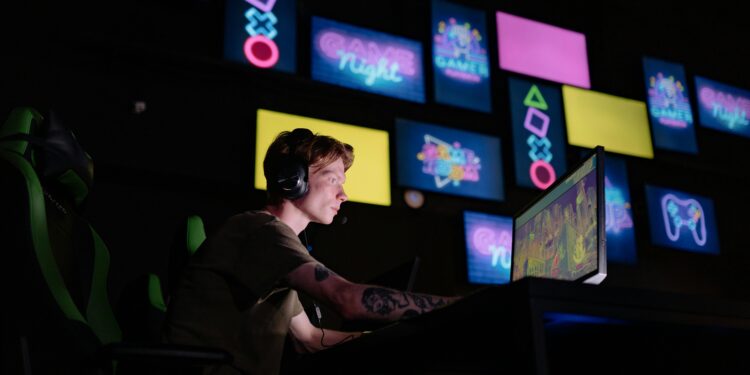The Future of Fun: How We Entertain Ourselves Online

In 2025, online entertainment has become more than just a pastime — it’s a defining feature of digital culture. From streaming platforms and social games to AI-driven media, the internet has reimagined how we seek joy, connect with others, and even escape.
Entertainment is no longer passive. It’s interactive, personal, and immediate. Whether you’re joining a Twitch live stream, watching a concert in the metaverse, or relaxing with a casual online game, the digital realm has blurred the line between spectator and participant.
So, how exactly are we entertaining ourselves online in this new age of hybrid fun?
1. Streaming: The Reign of Instant Gratification
The modern streaming economy thrives on one principle — on-demand everything. Platforms like Netflix, YouTube, and Disney+ have revolutionized consumption habits, allowing viewers to curate what, when, and how they watch.
Short-form platforms such as TikTok and Instagram Reels have only accelerated this transformation. Quick, snackable content satisfies the brain’s craving for novelty, keeping users endlessly scrolling through short bursts of dopamine-driven entertainment.
The next wave of streaming innovation lies in personalization — AI-generated playlists, interactive endings, and audience-driven programming where viewers choose the narrative.
2. Social Gaming: Where Friendship Meets Fun
The rise of social gaming has redefined what it means to play. Once a solitary or competitive pursuit, gaming has evolved into a shared, communal experience.
Platforms like Roblox, Fortnite, and Among Us have created vast social ecosystems where play and communication merge seamlessly. Even casual online games — puzzle apps, trivia challenges, and live casino simulations — have become part of this larger culture of connection and digital recreation.
In fact, many adults use light forms of online entertainment as stress relief and social downtime, enjoying moments of low-stakes fun with friends after long workdays.
These experiences tap into something universal: the joy of co-presence, of being together even while apart.
3. Digital Concerts and Live Events: The New Stage
The music industry has embraced virtual performance as a mainstream format. What began with pandemic-era experiments — like Travis Scott’s Fortnite concert or BTS’s virtual tours — has evolved into a long-term entertainment model.
Today, artists broadcast live sets through Twitch, YouTube Live, and TikTok, merging music, visuals, and audience interaction. Fans from different continents can attend the same concert simultaneously, comment in real-time, and feel part of a shared cultural moment.
This fusion of live streaming and digital creativity has given rise to a new kind of fan engagement — one where participation is as valuable as attendance in online entertainment.
4. The Rise of Interactive Storytelling
The future of storytelling is immersive and participatory. Platforms like Netflix have experimented with choose-your-own-adventure formats (as seen in Bandersnatch), while gaming studios are blurring cinematic and interactive boundaries.
Narrative-driven titles such as Life is Strange or Detroit: Become Human allow players to shape entire storylines based on their decisions.
Meanwhile, independent creators on YouTube and Twitch use chat polls to let audiences decide what happens next in real time. The result is a participatory culture where creators and consumers co-author online entertainment experiences.
5. Online Communities: Digital Third Spaces
From Reddit threads to Discord servers, online communities have become modern-day social clubs. These are digital “third places” — spaces that exist between home and work — where people connect over shared passions, hobbies, and fandoms.
For many, the act of belonging to a digital group is itself a form of entertainment. It’s where memes, debates, and creative collaborations thrive.
Even micro-communities within niche platforms — from streaming fan groups to hobby-based servers — offer a sense of intimacy that large social networks often lack. This is the foundation of community-driven online entertainment, where users shape content through participation and feedback.
6. Gamified Leisure: Play in Everyday Life
In recent years, the gamification of daily life has transformed how we think about fun and motivation. Fitness trackers reward movement with badges and streaks. Study apps turn productivity into a quest for points and levels.
Even casual real-money gaming platforms now use similar mechanics, offering light online entertainment through reward systems that emphasize responsibility, timing, and mindful engagement.
This shift demonstrates how play is no longer limited to games — it’s become a universal design philosophy. By turning routine actions into rewarding experiences, gamification has made entertainment inseparable from everyday behavior.
7. The AI Entertainment Boom
Artificial intelligence is quietly reshaping online entertainment in ways both subtle and revolutionary. AI-powered content generators now create art, music, and even storytelling experiences customized for individual users.
Streaming platforms use recommendation algorithms to curate personalized experiences, while AI chatbots act as digital companions in games or virtual environments.
We’re entering an era of co-creation, where technology collaborates with human imagination — blurring the boundaries between artist, performer, and audience.
8. The Return of Long-Form Content
Amid the flood of bite-sized videos, there’s a growing countertrend: a return to depth and immersion. Long-form podcasts, extended livestreams, and multi-hour Let’s Plays are thriving among audiences craving authenticity.
The appeal lies in connection over perfection. Instead of slick, overly edited clips, viewers are drawn to creators who share real-time thoughts, mistakes, and unfiltered experiences.
This trend signals a cultural shift — online entertainment is no longer just about distraction, but about companionship and continuity.
9. Virtual Reality and Metaverse Experiences
The promise of the metaverse continues to evolve, offering new frontiers for interactive entertainment. While mass adoption remains gradual, niche communities are flourishing into different dimensions of online entertainment.
VR concerts, digital art galleries, and online casinos with live dealer tables showcase how immersive technology blends social presence with experiential entertainment. These spaces replicate the thrill of physical engagement, creating an entirely new layer of play.
As hardware becomes more affordable, the metaverse could soon become the new “weekend hangout,” merging real-world energy with digital freedom.
The Future: Fun That Adapts to You
The next phase of online entertainment is personalization at scale. Every click, playlist, or viewing pattern contributes to a feedback loop of recommendation, customization, and adaptive storytelling.
In this evolving landscape, the most successful entertainment experiences will not just capture attention — they will co-evolve with users.
Whether you’re streaming a live concert, gaming with friends, or winding down with a digital puzzle, online entertainment in 2025 and beyond will continue to shape not just how we play, but how we connect, learn, and live.
From Screens to Experiences
Entertainment used to mean watching, listening, or playing. Now, it’s about being part of something. The future of online entertainment isn’t defined by technology alone, but by the human desire for connection, immersion, and shared moments.
As the lines between creator and consumer, game and life, blur even further, one truth remains clear — the digital world has made fun infinite, customizable, and more social than ever.








